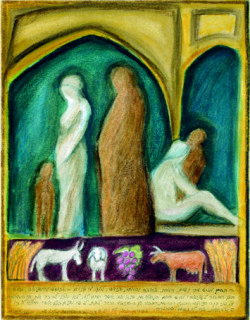
| God told Moses to tell the people of Israel how to treat women who were married to the same man. Also th man who had married more than one woman, regardless if both or more women were alive or one or more of the women were dead. Also the place of the first born which if accepted as the man’s son was to get two portions or a double portion. The first born son was the son first born to the man regardless if the wife was hated or was dead and the man now had another wife or wifes. |
לעשות – דרוש תרגום אלוהים הנחה את משה לחוקק חוקים כיצד ינהג גבר ישראלי עם אישה שבויה. |
Background reading:Auva“If a man has two wives, the one loved and the other disliked, and they have borne him children, both the loved and the disliked, and if the first-born son is hers that is disliked, then on the day when he assigns his possessions as an inheritance to his sons, he may not treat the son of the loved as the first-born in preference to the son of the disliked, who is the first-born, but he shall acknowledge the first-born, the son of the disliked, by giving him a double portion of all that he has, for he is the first issue of his strength; the right of the first-born is his. |
קריאת רקע:Auvaכִּי-תִהְיֶיןָ לְאִישׁ שְׁתֵּי נָשִׁים, הָאַחַת אֲהוּבָה וְהָאַחַת שְׂנוּאָה, וְיָלְדוּ-לוֹ בָנִים, הָאֲהוּבָה וְהַשְּׂנוּאָה; וְהָיָה הַבֵּן הַבְּכֹר, לַשְּׂנִיאָה. וְהָיָה, בְּיוֹם הַנְחִילוֹ אֶת-בָּנָיו, אֵת אֲשֶׁר-יִהְיֶה, לוֹ–לֹא יוּכַל, לְבַכֵּר אֶת-בֶּן-הָאֲהוּבָה, עַל-פְּנֵי בֶן-הַשְּׂנוּאָה, הַבְּכֹר. כִּי אֶת-הַבְּכֹר בֶּן-הַשְּׂנוּאָה יַכִּיר, לָתֶת לוֹ פִּי שְׁנַיִם, בְּכֹל אֲשֶׁר-יִמָּצֵא, לוֹ: כִּי-הוּא רֵאשִׁית אֹנוֹ, לוֹ מִשְׁפַּט הַבְּכֹרָה. {ס} |
:מודולים אחרים ביחידה זו
- Moshe, Exodus 3:1-2 – משה – שְׁמוֹת ג, א-ב
- Eved, Exodus 21:1-6 – עבד – שְׁמוֹת כא, א-ז
- Daughters of Zelophehad, Numbers 27:1-7 – בְּמִדְבַּר כז, א-ח
- Shvuia, Deuteronomy 21:10-14 – דְּבָרִים כא, י-יד
- Auva, Deuteronomy 21:15-17 – דְּבָרִים כא, טו-יז
- Rahab, Joshua 2:18 – רחב – יְהוֹשֻׁעַ ב, יח
- Crossing the Jordan River, Joshua 3:17 – יְהוֹשֻׁעַ ג, יז, עוברים את נהר הירדן
- Barak & Deborah, Judges 4:8-9 – שׁוֹפְטִים ד, ח-ט, ברק, דבורה
- Yael, Judges 4:21 – שׁוֹפְטִים ד, כא, יעל
- Gideon, Judges 7:5-6 – גדעון, שׁוֹפְטִים ז, ה-ו
- Jotham, Judges 9:8-15 – שׁוֹפְטִים ז, ח-טו, הָעֵצִים
- Ruth and Boaz at the Threshing Floor, Ruth 3:1-18 – רות ובועז בגורן רות, רות ג:א-יח
- Shof’tim 11:34 or Jephthah, Judges 11:34 – יפתח הגלעדי עם בתו היחידה, שׁוֹפְטִים יא, לד
- Samson and Delilah – new ropes, Judges 16:11-12 – שׁוֹפְטִים טז, יא-יב, שמשון ודלילה – חבלים חדשים
- Shimshon, Shof’tim 16:18 or Samson, Judges 16:18
- Samson, Judges 16:19 – שׁוֹפְטִים טז, יט, שמשון
- Levite and his Concubine, Judges 19:25-27 – לוי ופילגשו, שׁוֹפְטִים יט, כד-כז
- Daughters of Shiloh, Judges 21:20-21 – בְנוֹת שִׁילוֹ שׁוֹפְטִים כא, כ-כא
- Abigail had to act quickly, 1Samuel 25:18-24 – אביגיל פעלה מהר שְׁמוּאֵל א כה, יז-כד
- David and Bathsheba, 2 Samuel 11:2-5 – שְׁמוּ אֵל ב יא, ב-ה – דוד ובת שבע
- Kerem or vineyard, 1 Kings 21:7 – כרם – מְלָכִים א כא, ז